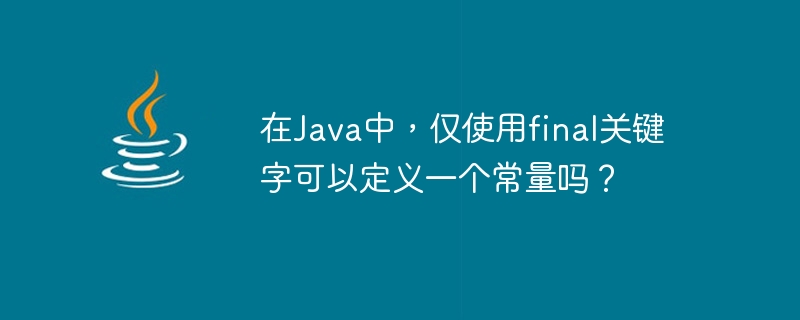In Java, is it possible to define a constant using only the final keyword?

A constant variable is a variable whose value is fixed and only one copy exists in the program. Once you declare a constant variable and assign a value to it, you cannot change its value again throughout the program.
Unlike other languages, Java does not directly support constants. However, you can still create a constant by declaring a variable as static and final.
static - Once you declare a static variable, they will be loaded into memory at compile time, i.e. only one copy will be available.
Final - Once you declare a final variable, its value cannot be modified.
So, you can create a constant in Java by declaring the instance variable as static and final.
Example
Demonstration
class Data {
static final int integerConstant = 20;
}
public class ConstantsExample {
public static void main(String args[]) {
System.out.println("value of integerConstant: "+Data.integerConstant);
}
}Output
value of integerConstant: 20 value of stringConstant: hello value of floatConstant: 1654.22 value of characterConstant: C
Constant without static keyword
If you create a constant without static keyword A final variable, although its value is unmodifiable, is created every time a new object is created. A separate copy of the variable is created.
Example
For example, consider the following Java program:
Online Demo
class Data {
final int integerConstant = 20;
}
public class ConstantExample {
public static void main(String args[]) {
Data obj1 = new Data();
System.out.println("value of integerConstant: "+obj1.integerConstant);
Data obj2 = new Data();
System.out.println("value of integerConstant: "+obj2.integerConstant);
}
}Output
value of integerConstant: 20 value of integerConstant: 20
Here, we create a final variable and try to print its value using both objects, although the value of the variable is the same in both instances, since we are using a different object for each instance, they are copies of the actual variable.
According to the definition of constant, you need to have only one copy of the variable in the entire program (class).
So, to create a constant as defined, you need to declare it as static and final.
The above is the detailed content of In Java, is it possible to define a constant using only the final keyword?. For more information, please follow other related articles on the PHP Chinese website!

Hot AI Tools

Undresser.AI Undress
AI-powered app for creating realistic nude photos

AI Clothes Remover
Online AI tool for removing clothes from photos.

Undress AI Tool
Undress images for free

Clothoff.io
AI clothes remover

AI Hentai Generator
Generate AI Hentai for free.

Hot Article

Hot Tools

Notepad++7.3.1
Easy-to-use and free code editor

SublimeText3 Chinese version
Chinese version, very easy to use

Zend Studio 13.0.1
Powerful PHP integrated development environment

Dreamweaver CS6
Visual web development tools

SublimeText3 Mac version
God-level code editing software (SublimeText3)

Hot Topics
 1377
1377
 52
52
 Perfect Number in Java
Aug 30, 2024 pm 04:28 PM
Perfect Number in Java
Aug 30, 2024 pm 04:28 PM
Guide to Perfect Number in Java. Here we discuss the Definition, How to check Perfect number in Java?, examples with code implementation.
 Random Number Generator in Java
Aug 30, 2024 pm 04:27 PM
Random Number Generator in Java
Aug 30, 2024 pm 04:27 PM
Guide to Random Number Generator in Java. Here we discuss Functions in Java with examples and two different Generators with ther examples.
 Weka in Java
Aug 30, 2024 pm 04:28 PM
Weka in Java
Aug 30, 2024 pm 04:28 PM
Guide to Weka in Java. Here we discuss the Introduction, how to use weka java, the type of platform, and advantages with examples.
 Smith Number in Java
Aug 30, 2024 pm 04:28 PM
Smith Number in Java
Aug 30, 2024 pm 04:28 PM
Guide to Smith Number in Java. Here we discuss the Definition, How to check smith number in Java? example with code implementation.
 Java Spring Interview Questions
Aug 30, 2024 pm 04:29 PM
Java Spring Interview Questions
Aug 30, 2024 pm 04:29 PM
In this article, we have kept the most asked Java Spring Interview Questions with their detailed answers. So that you can crack the interview.
 Break or return from Java 8 stream forEach?
Feb 07, 2025 pm 12:09 PM
Break or return from Java 8 stream forEach?
Feb 07, 2025 pm 12:09 PM
Java 8 introduces the Stream API, providing a powerful and expressive way to process data collections. However, a common question when using Stream is: How to break or return from a forEach operation? Traditional loops allow for early interruption or return, but Stream's forEach method does not directly support this method. This article will explain the reasons and explore alternative methods for implementing premature termination in Stream processing systems. Further reading: Java Stream API improvements Understand Stream forEach The forEach method is a terminal operation that performs one operation on each element in the Stream. Its design intention is
 TimeStamp to Date in Java
Aug 30, 2024 pm 04:28 PM
TimeStamp to Date in Java
Aug 30, 2024 pm 04:28 PM
Guide to TimeStamp to Date in Java. Here we also discuss the introduction and how to convert timestamp to date in java along with examples.
 Create the Future: Java Programming for Absolute Beginners
Oct 13, 2024 pm 01:32 PM
Create the Future: Java Programming for Absolute Beginners
Oct 13, 2024 pm 01:32 PM
Java is a popular programming language that can be learned by both beginners and experienced developers. This tutorial starts with basic concepts and progresses through advanced topics. After installing the Java Development Kit, you can practice programming by creating a simple "Hello, World!" program. After you understand the code, use the command prompt to compile and run the program, and "Hello, World!" will be output on the console. Learning Java starts your programming journey, and as your mastery deepens, you can create more complex applications.




